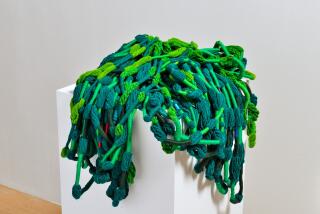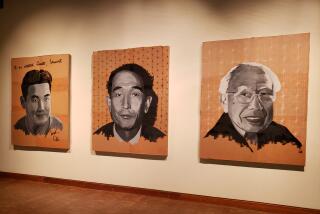Akira Yoshizawa gets Google Doodle: Wet origami? That’s genius
Akira Yoshizawa, recipient of a Google Doodle honoring the 101st anniversary of his birth, was no mere paper folder. He was an origami artist credited with raising the paper-folding technique to a higher plane. And then dousing it with water.
Yoshizawa’s work seems to have expression -- even emotion. From a flat piece of paper, he conjured sculpture. It helped that he had come up with a new technique, arguably his most important contribution to origami -- wet-folding, or “wet origami.”
He spritzed the paper to make it damp and then folded, creating more realistic figures. The technique was used for his famous gorilla origami.
Evolution of the Google Doodle
David Lister, a Briton who has studied the history of origami, calls Yoshizawa’s creations “magical and revolutionary.” He also notes that at one point in Yoshizawa’s life, he was so poor he couldn’t “pay even the postage on a letter.”
Those were the lean years.
Yoshizawa, born in 1911 to dairy-farming parents, left home young, at age 13. Despite having only six years of schooling, he knew enough to teach basic geometry to incoming workers at a factory in Tokyo. He used the origami of his childhood to help teach the concepts.
Then, in 1937, Yoshizawa decided to take the starving-artist route, throwing off his 9-to-5 routine and spending much of the next 20 years in poverty. To keep body and soul together, he reportedly sold soup door to door.
His big break came in 1952 with the publication of a Japanese magazine spread featuring his origami pieces based on zodiac symbols. It was a “sensation,” according to origami artist Eric Joisel.
Books and world tours eventually followed. With his first book in 1954, “New Origami Art,” Yoshizawa showed his system of diagramming origami designs -- those familiar dotted and dashed lines. He seemed to be saying: Do try this at home.
Yoshizawa was said to have created 50,000-plus works of origami art. Some sources say Yoshizawa didn’t sell his works, only giving them as gifts. He considered them “his children,” says Origami Maniacs.
By the end of his life, Yoshizawa’s work had been displayed at sites including the Cooper Union in New York, the Stedelijk Museum in Amsterdam and the Louvre.
ALSO:
Encyclopedia Britannica ceases to exist -- in print
Jew Pond is now set for a name change, but it wasn’t easy
Pi Day: Why are we transfixed by the delicious mystery of pi?
More to Read
Sign up for Essential California
The most important California stories and recommendations in your inbox every morning.
You may occasionally receive promotional content from the Los Angeles Times.











